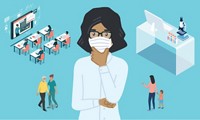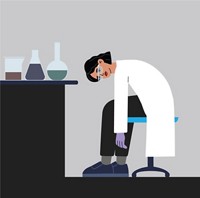Advertisement
Grab your lab coat. Let's get started
Welcome!
Welcome!
Create an account below to get 6 C&EN articles per month, receive newsletters and more - all free.
It seems this is your first time logging in online. Please enter the following information to continue.
As an ACS member you automatically get access to this site. All we need is few more details to create your reading experience.
Not you? Sign in with a different account.
Not you? Sign in with a different account.
ERROR 1
ERROR 1
ERROR 2
ERROR 2
ERROR 2
ERROR 2
ERROR 2
Password and Confirm password must match.
If you have an ACS member number, please enter it here so we can link this account to your membership. (optional)
ERROR 2
ACS values your privacy. By submitting your information, you are gaining access to C&EN and subscribing to our weekly newsletter. We use the information you provide to make your reading experience better, and we will never sell your data to third party members.
Career Tips
Covid-19
Get ready for a potential chemistry job crisis
Whatever COVID-19 does to chemical employment, it’s wise to start preparing your career emergency kit
by Chemjobber
April 10, 2020
| A version of this story appeared in
Volume 98, Issue 15

It is clear that COVID-19, the disease caused by the novel coronavirus, will bring an economic recession. The effects on chemical employment are much less clear.
The broad economic damage to the US economy alone is stark. In just 3 weeks, unemployment claims have surpassed 16 million. And the national unemployment rate reported by the US Bureau of Labor Statistics jumped from 3.5% in February to 4.4% in March. April’s unemployment rate is expected to be far higher.
Support nonprofit science journalism
C&EN has made this story and all of its coverage of the coronavirus epidemic freely available during the outbreak to keep the public informed. To support us:
Donate Join Subscribe
The fallout is starting to be seen in the chemical economy as well. The American Chemistry Council’s Chemical Activity Barometer, a measure of the industrial chemical economy, has fallen for 2 straight months and in March dropped the most since World War II.
Production of chemicals that go into construction and consumer uses trended down for March. The chemical manufacturing sector showed a slight drop in employment between February and March, down 3,000 jobs from February’s 850,400, according to the latest data from the US Bureau of Labor Statistics. It’s important to understand these broad trends in demand for chemicals and unemployment in chemistry in the coming months.
In an economic downturn, fewer people buy new houses and new cars, which decreases demand for the chemicals that go into them. The dramatic drops in the stock market will also affect pharma. It may become harder for small biotech firms to raise money from investors and seed new positions in start-ups. For major pharmaceutical companies, if stock prices and quarterly results begin to suffer, we may begin to see layoffs, a reversal of the hiring trends of the past few years.
Academia will be affected as well. For many universities and colleges, the sudden disruption in spring semesters is having an immediate financial impact. We are already seeing hiring freezes, but the effects of the economic downturn on tenure-track hiring won’t be clear in the data until early fall.
While the COVID-19 disaster is already upon us, I believe we have a period of weeks or perhaps months before job loss begins to seriously hit the chemical enterprise. What can we do to prepare ourselves for this challenging new job market?
If you prepared early for this pandemic, you may have gotten extra quantities of prescription medicines and stocked up on food and toilet paper. Similarly, it may be time to check in on your career emergency kit. If you’re a current job holder, you may be confident that the COVID-19-related economic downturn will not affect you. However, most of us can easily imagine reasons why our university, company, or government agency would require job cuts.
Those of us who are always thinking about our careers probably already have our elevator pitches at the ready and regularly update our LinkedIn profiles. For others, it’s time to focus on the basics: update your résumé and curriculum vitae, spruce up your LinkedIn page, and reach out to your network. Now is a great time to contact former colleagues, see what they are up to, and renew old ties. You may not be excited for one more videoconference call, but it’s good practice for a potential job interview.
If you’re a current job seeker, after an initial phone interview, you may have “on-site” interviews that are done as a series of video interviews. Make sure that you have a quiet, private, comfortable space and that you’ve practiced talking to people over your devices. For longer interviews, make sure that you’re undisturbed and that you’re able to get up and stretch your legs from time to time. While these sorts of virtual interviews may seem absurd, we simply don’t know when we will go back to hearty handshakes and in-person interviews.
I hope that there will not be a COVID-19-related job crisis in chemistry, but if there is one, these new obstacles and challenges represent a new opportunity for our community to pull together and help one another through it. We didn’t ask for this to come our way, but we do have time to think, organize, and prepare for what is coming.
Chemjobberis an industrial chemist who blogs about the chemistry job market at chemjobber.blogspot.com. Find all his columns for C&EN and suggest future topics at cenm.ag/benchandcubicle.
Views expressed are those of the author and not necessarily those of C&EN or ACS.





Join the conversation
Contact the reporter
Submit a Letter to the Editor for publication
Engage with us on Twitter